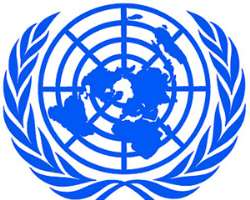SECRETARY-GENERAL, IN MESSAGE TO SECURITY CONFERENCE IN NIGERIA, REAFFIRMS HIS SOLIDARITY WITH VICTIMS OF EXTREMISM, TERROR

NEW YORK, September 4, 2014/African Press Organization (APO)/ -- Following is UN Secretary-General Ban Ki-moon's message, as delivered by Said Djinnit, High-Level Representative of the Secretary-General to Nigeria, for the Third Ministerial Conference on Security in Nigeria, today in Abuja:
I thank Nigerian Foreign Minister Aminu Wali for inviting the United Nations to participate in this third ministerial conference on Security in Nigeria. I also thank the Government and people of Nigeria for hosting this important meeting. This conference illustrates our collective determination to support the efforts of Nigeria and the region against the increasing threat posed by Boko Haram.
I remain deeply concerned by the continuous violence in the north-east of the country, including the killing of innocent civilians and the abduction of girls, women and men. I reaffirm my solidarity with the victims as well as with the people of Nigeria as they face extremism and terror.
The human rights violations are appalling, and the humanitarian situation is dire. The situation is being aggravated by the overall vulnerability of the population. Schooling and farming have been disrupted, and food insecurity is on the rise.
In the face of these daunting challenges, national unity will be crucial. The recent activities of Boko Haram in Chad and Cameroon are a strong reminder of the need to further strengthen regional cooperation. I welcome the progress that has been made towards establishing the regional intelligence unit, as agreed upon during the previous meetings in London and Paris.
The United Nations, through my High-Level Representative and the United Nations country team, will continue to support the government of Nigeria in the area of humanitarian assistance, in efforts against violent extremism and in capacity-building on international human rights and humanitarian law.
An integral part of these efforts will be to ensure that counter-terrorism activities are carried out in accordance with international human rights standards and do not themselves fuel the radicalization. The struggle against terrorists will not be won if local populations feel they are being unfairly and collectively targeted.
The United Nations country team is also working with partners to implement an Integrated Support Program for the north-east, which is aimed at assisting the families of the abducted Chibok girls and the affected populations.
Earlier this year, the Security Council Al-Qaida Sanctions Committee added Boko Haram to its list, and established a Monitoring and Reporting Mechanism on grave violations against children pursuant to the listing of the group in the report of the Secretary-General on Children and Armed Conflict. These steps are yet another expression of the firm commitment of the United Nations to use all the tools at its disposal to help tackle this threat, with the protection of the human rights of the most vulnerable at the centre of its response. I appeal to the international community to provide the coordinated support needed for resolute action against Boko Haram.
